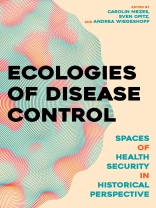Ecologies of Disease Control explores the relationship between ecological conceptions of epidemics and forms of infectious disease control. Bringing historical, sociological, anthropological, and geographical case studies from the late eighteenth century to the present into dialogue, contributors unearth a multiplicity of spatial configurations in governing epidemics, putting contemporary health security regimes into historical perspective. Emerging infectious diseases—HIV/AIDS, malaria, tuberculosis, influenza, SARS, West Nile virus, Marburg virus—and the threat they posed to national security and geopolitical order have incentivized the development of global health security initiatives since the 1990s. Yet, as this volume reveals, various practices of disease control have made epidemic outbreaks a matter of ecological management as well. These practices involve ecosystems and infrastructures, more-than-human mobilities, disease landscapes, elemental atmospheres, metabolic entanglements, and real-time information systems. As scholars in the humanities and social sciences begin to adopt ecology as an analytical framework, this volume offers a critical perspective on the ecological concepts that inform historical and current practices of health security.
Despre autor
Carolin Mezes (Editor) Carolin Mezes is a postdoctoral fellow at Bielefeld University.Sven Opitz (Editor) Sven Opitz is professor of political sociology at Philipps University Marburg.Andrea Wiegeshoff (Editor) Andrea Wiegeshoff is an affiliated researcher in the Department of Modern History at the University of Marburg and an adjunct lecturer at the universities of St. Gallen and Bonn.












